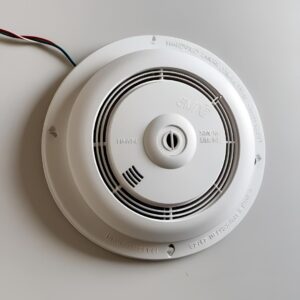Did you know that functioning smoke alarms cut the risk of dying in a house fire by over 50%? Despite this, many homes are either missing smoke detectors or have alarms that don’t work properly. With this startling statistic, one thing is clear—choosing the right smoke detector, including considering battery vs hardwired smoke detector, and keeping it well-maintained is essential to protecting your home and family.
If you’re unsure about choosing between a battery vs hardwired smoke detector, this guide is designed to assist you. We will contrast the two varieties, give a detailed guide on installation procedures for both, and present upkeep techniques to guarantee your detectors function effectively when required.
Battery-Powered vs. Hardwired Smoke Detector
What Are Battery-Powered Smoke Detectors?
Battery-powered smoke detectors are standalone units that run entirely on replaceable or built-in batteries. They are not dependent on a home’s electrical wiring, making them a convenient and flexible option.
Key Pros
- Ease of Installation: Ideal for self-installation without requiring an electrician.
- Portability: Ideal for tenants or individuals who relocate often.
- Affordability: Typically more budget-friendly than hardwired models.
Key Cons
- Battery Maintenance: Regular replacement is necessary to prevent failure.
- Potential for Malfunction: Alarms can fail if batteries are neglected or improperly installed.
What Are Hardwired Smoke Detectors?
Hardwired smoke detectors link directly to your home’s electrical system and typically include a battery backup to operate during power outages. They are built for enduring reliability and are frequently linked together, enabling all alarms to activate concurrently when smoke is detected.
Key Pros
- Reliable Power Source: Less reliance on batteries as a primary power source.
- Interconnected Alerts: Offers whole-home notification if one alarm detects smoke.
Key Cons
- Professional Installation: Installation requires wiring expertise and may need an electrician.
- Higher Upfront Cost: The cost of the detector and professional service adds up.
Choosing the Right Detector
When deciding between battery-powered and hardwired smoke detectors, consider the following factors:
- Budget: If budget is an issue, battery-operated options are the best choice.
- Homeownership Status: Renters will likely prefer battery-powered units, while homeowners may benefit from the long-term reliability of hardwired systems.
- Home Size: Larger homes may benefit from interconnected hardwired detectors for streamlined safety.
Travel often or want extra convenience? Smart detectors (discussed later) could be the ideal solution.
Installation Tips for Smoke Detectors
Installing Battery-Powered Smoke Detectors
Tools You’ll Need:
- Screwdriver
- Wall anchors (if mounting in drywall)
Step-by-Step Guide:
- Choose the Right Spot:
Install on ceilings or high walls, ideally outside bedrooms and in every major living area. Avoid areas near vents, windows, or kitchens to reduce false alarms.
- Mount the Bracket:
Secure the mounting plate to the ceiling or wall using screws and anchors.
- Insert Batteries:
Install fresh batteries and ensure they’re placed correctly.
- Test the Device:
Activate the test button to confirm the alarm is working.
Common Pitfails to Avoid:
- Don’t place detectors near airflow sources that may dilute smoke concentrations.
- Avoid installing too low on the wall or improperly securing the bracket.
Installing Hardwired Smoke Detectors
Tools You’ll Need:
- Voltage tester
- Wire strippers
- Screwdriver
Step-by-Step Guide:
- Turn Off Power:
Switch off electricity at the circuit breaker for safety.
- Prepare Wiring:
Confirm there is no live voltage using a voltage tester. Connect the wires based on their color codes (e.g., black for power, white for neutral, green/copper for ground).
- Attach the Device:
Secure wires to the detector’s harness and attach the detector to the ceiling mount.
- Power Up and Test:
Restore electricity and press the test button to check functionality.
When to Call a Pro:
If you face complicated wiring situations or are uncertain about installation, it’s advisable to employ a qualified electrician.
Maintenance Guidelines for Smoke Detectors
For Battery-Powered Units
- Check Batteries Every 6 Months:
Ensure batteries haven’t drained by testing regularly.
- Replace Annually or When Required:
Always switch to new batteries during routine checks to stay protected.
- Test Monthly:
Use the test button to confirm the alarm sounds correctly.
For Hardwired Units
- Monthly Testing:
Check the alarm function by pressing the test button.
- Back-Up Battery Management:
Inspect and replace the backup battery at least once per year.
- Dust and Debris Cleaning:
Utilize a vacuum or compressed air to avoid dust buildup.
General Tips for All Detectors
- Replace Detectors After 10 Years:
Sensors degrade over time, even if they appear to function normally.
- Avoid Painting Over Units:
Obstructing vents can prevent accurate detection.
- Minimize False Alarms:
Address environmental causes of false alarms, such as steam or cooking fumes, promptly.
Advanced Tips and Best Practices
Interconnected Smoke Detectors
Interconnected systems are ideal for large homes, where rapid communication between alarms is crucial. Regularly test all alarms within the system to confirm seamless operation.
Smart Smoke Detectors
Modern smart detectors such as Nest Protect and First Alert Onelink offer mobile notifications, compatibility with smart home systems, and additional safety functionalities like emergency lighting alerts. Ensure that the firmware is regularly updated for improved performance.
Make Your Home Safer Today
Installing and maintaining smoke detectors is one of the simplest yet most effective ways to secure your home and loved ones. Whether you choose battery-operated detectors for flexibility or hardwired ones for reliability, the important thing is to make sure you act.
Utilize this guide to select the ideal choice for yourself, set them up properly, and adhere to routine upkeep suggestions to guarantee they remain functional.
Don’t postpone until it’s too late. Examine your existing detectors today and improve or set up new ones as necessary for reassurance and safety, particularly if you intend to sell a fire-damaged house.
Previous